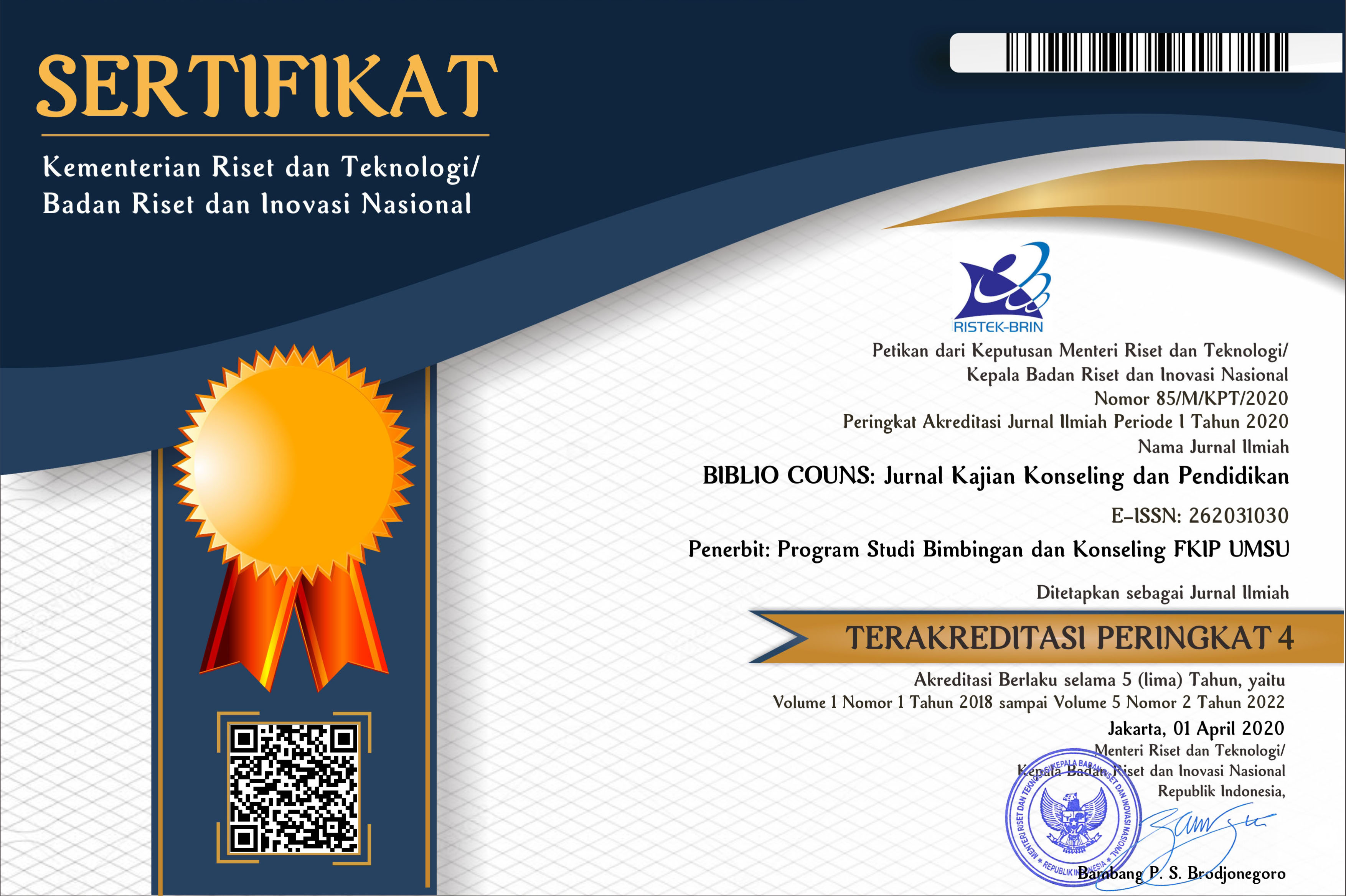Efektifitas Cognitive Behaviour Therapy di Sekolah: Meta Analisis Review
Abstract
Cognitive behavioral therapy (CBT) is a popular therapy that is applied to various problems. The purpose of this study is to provide a survey approved by a meta-analysis supported by CBT. This study reviews 10 meta-analytic studies and discusses CBT in students in schools for the following problems, namely: Anxiety, Emotion, Self-Confidence, Self-Efficacy, and CBT Based on Local Wisdom. Additional analytical meta review to address CBT problems for various problems in school children. The strongest support for CBT is from monitoring and transition. CBT showed a higher response rate and was widely considered in these 7 reviews and only three reviews reported that CBT had a lower response rate in care. In general, the CBT evidence base is very strong. However, additional research is needed to study the efficacy of CBT for randomized controlled studies. In addition, using CBT in schools depends on the level of education and age of children.
Keywords
Full Text:
PDFReferences
Ali Khaneh Keshi, B. (2013). Effectiveness of Cognitive Behavior Therapy on Self-Efficacy Among High School Students. Asian Journal Of Management Science and Education, 2(4), 6879.
Alladin, Assen. (2015). Integrative CBT for Disorders. In John Wiley (Ed.), Wiley Blackdell (First Edit). John Wiley & Sons, Ltd.
Anastopoulos, A. D., & King, K. A. (2015). A Cognitive-Behavior Therapy and Mentoring Program for College Students With ADHD. Cognitive and Behavioral Practice, 22(2), 141151. https://doi.org/10.1016/j.cbpra.2014.01.002
Asbrand, J., Heinrichs, N., Nitschke, K., Wolf, O. T., & Tuschen-ca, B. (2019). Psychoneuroendocrinology Repeated stress leads to enhanced cortisol stress response in child social anxiety disorder but this e ff ect can be prevented with CBT. 109(June). https://doi.org/10.1016/j.psyneuen.2019.06.003
Asbrand, J., Heinrichs, N., Nitschke, K., Wolf, O. T., Schmidtendorf, S., & Tuschen-Caffier, B. (2019). Repeated stress leads to enhanced cortisol stress response in child social anxiety disorder but this effect can be prevented with CBT. Psychoneuroendocrinology, 109 (January). https://doi.org/10.1016/j.psyneuen.2019.06.003
Berle, D., Moulds, M. L., Starcevic, V., Milicevic, D., Dale, E., Viswasam, K., Brakoulias, V., Berle, D., Moulds, M. L., Starcevic, V., Milicevic, D., Dale, E., Viswasam, K., & Brakoulias, V. (2016). Does emotional reasoning change during cognitive behavioural therapy for anxiety ? Cognitive Behaviour Therapy ISSN:, 37(1). https://doi.org/10.1080/16506073.2015.1115892
Castella, K. De, Goldin, P., Jazaieri, H., Heimberg, G., Dweck, C. S., & Gross, J. J. (2014). Emotion Beliefs and Cognitive Behavioural Therapy for Social Anxiety Disorder. January 2015, 3741. https://doi.org/10.1080/16506073.2014.974665
Cully, J. A., & Teten, A. L. (2008). Therapists_Guide_To_Brief_Cbtmanual. https://depts.washington.edu/dbpeds/therapists_guide_to_brief_cbtmanual.pdf
Eiraldi, R., Mautone, J. A., Khanna, M. S., Power, T. J., Orapallo, A., Cacia, J., Schwartz, B. S., McCurdy, B., Keiffer, J., Paidipati, C., Kanine, R., Abraham, M., Tulio, S., Swift, L., Bressler, S. N., Cabello, B., & Jawad, A. F. (2018). Group CBT for Externalizing Disorders in Urban Schools: Effect of Training Strategy on Treatment Fidelity and Child Outcomes. Behavior Therapy, 49(4), 538550. https://doi.org/10.1016/j.beth.2018.01.001
Esbjorn, B. H. (2016). Can Parents Treat their Anxious Child using CBT? A Brief Report of a Self-Help Program. Acta Psychopathologica, 02(01), 15. https://doi.org/10.4172/2469-6676.100036
Essau, C. A., Sasagawa, S., Jones, G., Fernandes, B., & Ollendick, T. H. (2019). Evaluating the real-world effectiveness of a cognitive behavior therapy- based transdiagnostic program for emotional problems in children in a regular school setting. Journal of Affective Disorders, 253(April), 357365. https://doi.org/10.1016/j.jad.2019.04.036
Fernndez-martnez, I., Orgils, M., Morales, A., Espada, J. P., & Essau, C. A. (2019). One-Year follow-up effects of a cognitive behavior therapy-based transdiagnostic program for emotional problems in young children : A school-based cluster-randomized controlled trial. Journal of Affective Disorders, October, 19. https://doi.org/10.1016/j.jad.2019.11.002
Fitzgerald, S. (Clinical psychologist). (2013). CBT workbook For Dummies. John Wiley & Sons, Ltd.
Freeman, A. (2006). Encyclopedia of cognitive behavior therapy. In Choice Reviews Online (Vol. 43, Issue 07). https://doi.org/10.5860/choice.43-3763
Harding, L. (2017). Building positive thinking habits: increasing self-confidence & resilience in young people through CBT. Educational Psychology in Practice, 33(3), 335336. https://doi.org/10.1080/02667363.2017.1295603
Hidayah, N., & Hanafi, H. (2017). Urgency cognitive-behavioral counseling based on local wisdom for junior high school counselor in East Java. Advances in Social Science, Education and Humanities Research, 118(May 2019). https://doi.org/10.2991/icset-17.2017.149
Hidayah, N., & Ramli, M. (2017). Need of Cognitive-Behavior Counseling Model Based on Local Wisdom to Improve Meaning of Life of Madurese Culture Junior High School Students. Advances in Social Science, Education and Humanities Research, 128(Icet), 301307. https://doi.org/10.2991/icet-17.2017.53
Ilkhchi, S., Poursharifi, H., & Alilo, M. (2011). The Effectiveness of Cognitive-Behavioral Group Therapy on Self-Efficacy and Assertiveness Among Anxious Female Students of High Schools. Procedia - Social and Behavioral Sciences, 30, 25862591. https://doi.org/10.1016/j.sbspro.2011.10.506
Jongerden, L., & Bgels, S. M. (2015). Parenting, Family Functioning and Anxiety-Disordered Children: Comparisons to Controls, Changes After Family Versus Child CBT. Journal of Child and Family Studies, 24(7), 20462059. https://doi.org/10.1007/s10826-014-0005-6
Lars Goran Ost, E. S. (2013). Cognitive Behaviour Therapy for Dental Phobia and Anxiety. In Cognitive Behaviour Therapy for Dental Phobia and Anxiety. https://doi.org/10.1002/9781118499825
Lotfi, S., Eizadi-fard, R., Ayazi, M., & Amin, M. (2011). Social and The Effect of Meichenbaum s Cognitive Behaviour Modification Therapy on Reduction of Test Anxiety Symptoms in High School Girls. Procedia Social and Behavioral Sciences, 00, 835838. https://doi.org/10.1016/j.sbspro.2011.10.162
Maric, M., van Steensel, F. J. A., & Bgels, S. M. (2018). Parental Involvement in CBT for Anxiety-Disordered Youth Revisited: Family CBT Outperforms Child CBT in the Long Term for Children With Comorbid ADHD Symptoms. Journal of Attention Disorders, 22(5), 506514. https://doi.org/10.1177/1087054715573991
Mckay, D. (2019). ScienceDirect Introduction to the Special Issue : Mechanisms of Action in Cognitive-Behavior Therapy. Behavior Therapy, xxxx, 68. https://doi.org/10.1016/j.beth.2019.07.006
Mcleod, B. D., Islam, N. Y., Chiu, A. W., Smith, M. M., Chu, B. C., Wood, J. J., Smith, M. M., & Wood, J. J. (2013). The Relationship Between Alliance and Client Involvement in CBT for Child Anxiety Disorders The Relationship Between Alliance and Client Involvement in CBT for Child Anxiety Disorders. Journal of Clinical Child & Adolescent Psychology, October 2014, 3741. https://doi.org/10.1080/15374416.2013.850699
Neill, E. L., Weems, C. F., Scheeringa, M. S., Neill, E. L., Weems, C. F., Scheeringa, M. S., Neill, E. L., & Weems, C. F. (2017). CBT for Child PTSD is Associated with Reductions in Maternal Depression : Evidence for Bidirectional Effects CBT for Child PTSD is Associated with Reductions in Maternal Depression : Evidence for Bidirectional Effects. Journal of Clinical Child & Adolescent Psychology, 00(00), 111. https://doi.org/10.1080/15374416.2016.1212359
Nosouhian, H., & Javadi, F. (2018). The comparison between self-confidence and symptoms of aggression and hyperactivity (ADHD) in children. Early Child Development and Care, 188(6), 723730. https://doi.org/10.1080/03004430.2016.1230608
Passiatore, Y., Pirchio, S., Oliva, C., Panno, A., & Carrus, G. (2019). Self-efficacy and anxiety in learning English as a Foreign language: Singing in class helps speaking performance. Journal of Educational, Cultural and Psychological Studies, 2019(20), 121138. https://doi.org/10.7358/ecps-2019-020-passi
Raedt, R. De. (2020). Contributions from neuroscience to the practice of Cognitive Behaviour Therapy: Translational psychological science in service of good practice. Behaviour Research and Therapy, 103545. https://doi.org/10.1016/j.brat.2019.103545
Rohde, P., Stice, E., Shaw, H., & Gau, J. M. (2014). Behaviour Research and Therapy Cognitive-behavioral group depression prevention compared to bibliotherapy and brochure control : Nonsigni fi cant effects in pilot effectiveness trial with college students. Behaviour Research and Therapy, 55, 4853. https://doi.org/10.1016/j.brat.2014.02.003
Rosmawati Mohamad Rasit, S. Z. C. A. R. (2017). The Role of Self Efficacy and Cognitive Behaviour Therapy in Forming Posocial Behaviour. Cognitive Bahviour Therapy, 5(1). https://doi.org/10.5772/intechopen.81957
Salomonsson, S., Santoft, F., Lindster, E., Ejeby, K., st, L., Lekander, M., Ljtsson, B., & Hedman-, E. (2019). Predictors of outcome in guided self-help cognitive behavioural therapy for common mental disorders in primary care. Cognitive Behaviour Therapy, 00(00), 120. https://doi.org/10.1080/16506073.2019.1669701
Samhsa, Somers, J., Queree, M., Broderick, J., Leung, B., Cully, J. A., Teten, A. L., & Anxiety BC. (2006). WHAT IS CBT ? What to Expect if You See a CBT Therapist. Department of Veterans Affairs South Central MIRECC, March, 117.
Stallard, P., Skryabina, E., Taylor, G., Phillips, R., Daniels, H., Anderson, R., & Simpson, N. (2014). Classroom-based cognitive behaviour therapy ( FRIENDS ): a cluster randomised controlled trial to Prevent Anxiety in Children through Education in Schools ( PACES ). The Lancet Psychiatry, 1(3), 185192. https://doi.org/10.1016/S2215-0366(14)70244-5
Taylor, D. J., Zimmerman, M. R., Gardner, C. E., Williams, J. M., Grieser, E. A., Tatum, J. I., Bramoweth, A. D., Francetich, J. M., & Ruggero, C. (2014). A pilot randomized controlled trial of the effects of cognitive-behavioral therapy for insomnia on sleep and daytime functioning in college students. Behavior Therapy, 45(3), 376389. https://doi.org/10.1016/j.beth.2013.12.010
Vincent, L., Norton, P. J., & Norton, P. J. (2018). Predictors and consequences of sudden gains in transdiagnostic cognitive-behavioural therapy for anxiety disorders. Cognitive Behaviour Therapy, 00(00), 120. https://doi.org/10.1080/16506073.2018.1513557
Vosoughi, S., Poursharifi, H., & Mahmood, M. (2014). Procedia Social and The effectiveness of Cognitive-Behavioral Group Therapy on self- efficacy and assertiveness among anxious female students of high schools. Procedia Social and Behavioral Sciences, 21(1), 25862591. https://doi.org/10.1016/j.sbspro.2011.10.506
Wong, N., Kady, L., Mewton, L., Sunderland, M., & Andrews, G. (2014). Preventing anxiety and depression in adolescents : A randomised controlled trial of two school based Internet-delivered cognitive behavioural therapy programmes. Internet Interventions, 1(2), 9094. https://doi.org/10.1016/j.invent.2014.05.004
DOI: https://doi.org/10.30596/bibliocouns.v3i1.4668
Refbacks
- There are currently no refbacks.
Biblio Couns: Jurnal Kajian Konseling dan Pendidikan
Universitas Muhammadiyah Sumatera Utara
Kampus Utama
Jl. Kapten Muchtar Basri No.3, Glugur Darat II,Medan
Sumatera Utara-20238
E-mail: jbcons@umsu.ac.id



